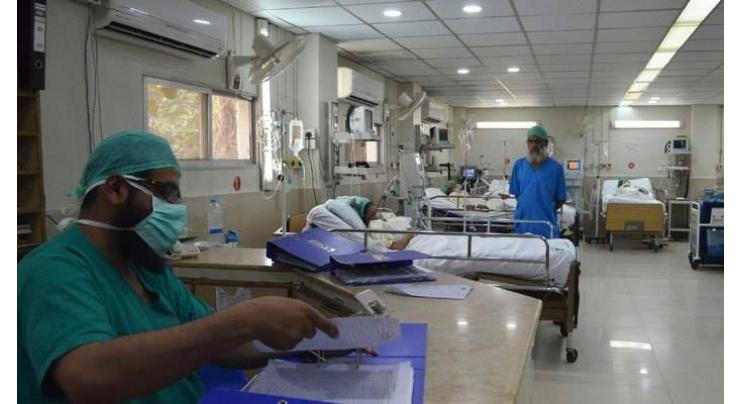
Senate Body For Improving Service Delivery System At Capital's Hospitals
Muhammad Irfan Published September 10, 2020 | 07:02 PM

Senate Standing Committee on National Health Services, Regulations and Coordination on Thursday directed the Ministry of National Health Services, Regulations and Coordination to improve quality of service delivery system at federal capital's public sector hospitals
ISLAMABAD, (UrduPoint / Pakistan Point News - 10th Sep, 2020 ) :Senate Standing Committee on National Health Services, Regulations and Coordination on Thursday directed the Ministry of National Health Services, Regulations and Coordination to improve quality of service delivery system at Federal capital's public sector hospitals.
The committee meeting which was chaired by Senator Khushbakht Shujaat asked the ministry concerned to ensure provision of basic health facilities at federal capital's hospitals and address concerns of patients.
The body also expressed its displeasure over appointments of heads of hospitals and other federal health organizations on temporary basic.
The committee asked the ministry of National Health Services to submit report on officials working under the ministry in its next meeting.
The committee also expressed its dissatisfaction over performance of Pakistan Medical and Dental Council (PMDC). The committee chairperson said that PMDC should address the issues of medical students on immediate basis and asked the council to complete registration process of 65 doctors of a private medical college and submit report to the committee.
The committee took serious notice of the attitude of President PMDC and said that a Privilege Motion must be moved against him. They also stressed the need for PMDC not to play with the lives of the students who have recently graduated from Abbottabad International Medical College (AIMC).
They were of the view that the committee will not allow PMDC to play with their lives. The committee recognized the fact that PMDC had directed AIMC to stop admissions, and that it was sheer negligence on the part of AIMC Administration that it did not pay heed.
The committee, however, felt that the students cannot be held responsible for this and hence unanimously took the decision that PMDC issue certificates to all students immediately.
Special Assistant to the Prime Minister on National Health Services, Regulations and Coordination Dr Faisal Sultan assured the committee that the government will improve entire health system being part of its reform agenda to improve health care facilities for country people.
He said that to make a visible change in health system of the country is the top priority of Prime Minister Imran Khan. He added the ministry was working on the vision of PM Imran Khan to have better health infrastructure in the country with quality medical services.
Dr Faisal Sultan informed the committee that catering to complete national need was beyond NIH's production capacity. To maintain the supply of the vaccine beyond that is the responsibility of the provinces.
Officials from the ministry assured the committee that the ministry will appoint regular heads of its organizations as soon as possible. They said that in this regard advertisements will be issued to appoint officers on these posts on merit.
The committee received briefing on performance and future strategy of National Institute of Health (NIH). Executive Director NIH briefed the committee regarding the issue of shortage of Anti-Rabies Vaccine (ARV) in Punjab.
The committee was informed that the facility to manufacture ARV at the National Institute of Health (NIH) was established in the late eighties with limited design production capacity of 150000 doses per year.
He added since its inception NIH had been producing and supplying these doses all over Pakistan. During the current Financial Year (FY) this Institute has produced more than 225000 doses of ARV that were supplied to the four provinces.
He said that in the year 2020-21 NIH is making all out efforts to for a further 200,000 dose production through its own resources. A comprehensive plan has been submitted to the Ministry for funding and this would enhance the production capacity upto 600,000 doses per year, thus reducing the supply and demand gap, he added.
Members of the committee stressed that the government must take full responsibility of supplying vaccines to hospitals in the four provinces, since victims are usually the most vulnerable of society.
Related Topics
Recent Stories

Mired in crisis, Boeing reports another loss

Session Awarding Ceremony 2024 held at Cadet College Muzaffarabad

Austrian ski great Hirscher to make comeback under Dutch flag

Pakistan, Japan agrees to convene 'Economic Policy Dialogue'

FM Dar conveys deepest sympathy on torrential rains devastation in UAE

Spain PM Sanchez says weighing resignation after wife's graft probe

Tennis: ATP/WTA Madrid Open results - 1st update

Long-lost Klimt portrait auctioned off for 30 mn euros

Osaka seals first win on clay since 2022 in Madrid

Earthquake jolts Karachi

Sindh minister orders operation after attack on police in Ghotki

TikTok to fight US ban law in courts
More Stories From Pakistan
-
Pakistan, UK discuss collaboration in education sector
5 hours ago -
PMD forecast rain-windstorm/thunderstorm for various parts of country
6 hours ago -

Session Awarding Ceremony 2024 held at Cadet College Muzaffarabad
6 hours ago -

FM Dar conveys deepest sympathy on torrential rains devastation in UAE
6 hours ago -

Earthquake jolts Karachi
7 hours ago -

Sindh minister orders operation after attack on police in Ghotki
7 hours ago
-

Police book youngster for abusing student for one year
7 hours ago -

Police arrest 23 suspects, recover stolen money, phones
7 hours ago -

Colorful cultural festival concludes at NUML
7 hours ago -

Immunization awareness week kicks off in Balochistan
7 hours ago -

Ministers visit Aziz Bhatti Shaheed Hospital following roof collapse incident
7 hours ago -

IHC serves notices in petition against 'roti' price fixation
7 hours ago









